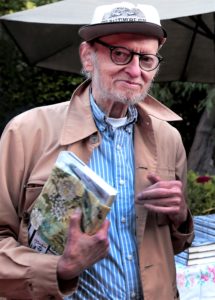
Artist Foumi Greenfeld is also an author, who has won top literary prizes in Japan.
Photo: Patricia Williams
(Editor’s note: Friends and family held a celebration of life for acclaimed writer Josh Greenfeld at the Palisades Library on February 29. His wife, Foumiko Kometani, is an artist and author. Posing as a reporter, Greenfeld penned an amusing story about Foumiko for Editor Bill Bruns in 1999. Kometani’s artwork, which includes colorful collages, was on display at the Palisades Library’s community room through March 6.)
By JOSH GREENFELD
“World-class authors are no strangers to the Palisades: Thomas Mann, Henry Miller, Lion Feuchtwanger, and Raymond Chandler all took up residence here at one time or another. But no writer has lived longer and more quietly in the Palisades than Foumiko Kometani.
Kometani, a Palisades resident for the past 25 years, first came into prominence in Japanese letters in 1985 when she was awarded the first prize in the Newcomer Contest of both Schincho and Bungaki magazines, two of Japan’s most prestigious literary magazines.
It was a news event in Japan, the first time any newcomer had ever won two such laurels. And in 1986, one of the two prize-winning stories, “Passover,” received Japan’s most important literary prize, the Akutagawa Award, which has been describes as a “Pulitzer Prize with a black belt.”
Since then, Kometani has published 12 books (three translations, three nonfiction collections of essays and six works of fiction), including her latest book, “Family Business,” which just recently won the coveted 1998 Woman’s Prize, awarded annually for the best achievement in fiction by a woman.
Kometani, a small gray-haired woman, wearing a gray smock over black tights, was seated on the floor of her living room sipping tea when I interviewed her last week. On the walls hung abstract expressionist paintings she had done when she first came to America as an artist 38 years ago. Outside the windows, behind a tall curtain of bamboo, was the garden she cultivated.
I first asked how she felt about her latest accolade, an award consisting of 1,000,000 yen in cash (over $8,500), a Cartier watch, a Mikimoto pearl ring and a DuPont pen.
She replied that she was very honored but not very much richer since she and her husband had spent all of the prize money when they went over to Japan to pick it up at a special ceremony. “Hotels in Tokyo are not cheap,” she said. “And my husband eats a lot.”
What was her most vivid memory of the ceremony? Was it being handed the scroll? The gifts? The speeches of praise or her acceptance speech?”
“No, it was not the ceremony. Or the party afterwards, at which my husband drank too much. It was before the ceremony. The publishing company sponsoring the award sent a chauffeured car to pick us up at the hotel along with a pretty young editor who works there to be our escort. And after we got to the hall the president of that company greeted us and studied the young editor who was in their employ and asked if she was our daughter. I laugh whenever I think about it.”
And how did she feel being back in the Palisades?
“No matter where I go, I’m always glad to come back to the Palisades. Except for three things. The leaf blowers are still blowing me awake. The monster houses coming up are a growing eyesore. And the juggernaught cars are making it increasingly difficult to squeeze into parking spaces in the supermarket lots.
“But I still enjoy the small-town feel and the neighborliness of the people in the Palisades.”
But what is it like as a writer to be living in a place where her neighbors and friends can’t read her books?
“There are disadvantages. A writer likes to get direct feedback from an immediate audience, so the fact that I can write in a different language can be very frustrating. But it’s also easier on the nerves not having to be part of the literary jungle and have to deal with the publishing politics that I would have to endure living in Japan. And I can see Japan very clearly by not living there.
“At the same time, I can also experience America more objectively by living here. I’m now a stranger in both countries, which serves my purpose as a writer just fine.”
Her husband is a writer, had he any influence on her work?
“Only in providing me with material.”
But surely as a writer, he must help her out in some way?
“Only when he cooks,” she said.
I thanked her for the interview, bowed and began to leave, when she called out, “Don’t forget to take out the garbage.”
Kometani, a seeming model of politeness and decorum, never issued such requests, I’m sure, to any of the Japanese reporters and TV broadcasters who come to interview her. Still as a representative of editor Bill Bruns, I took no offense. Because I also happen to be her husband of 38 years and the father of her two sons, the removal of trash is usually my detail.
“Remember to put the recyclables in the blue bin,” I heard as I closed the door.
Josh Greenfeld was a novelist (“The Return of Mr. Hollywood”), screenwriter (he was nominated for an Academy Award for “Harry and Tonto”), playwright (“I Have a Dream” and “The Last Two Jews of Kabul”), and the author of an award-winning trilogy: “A Child Called Noah,” “A Place for Noah” and “A Client Called Noah.”


FABULOUS! THANK YOU, BILL AND SUE…..M